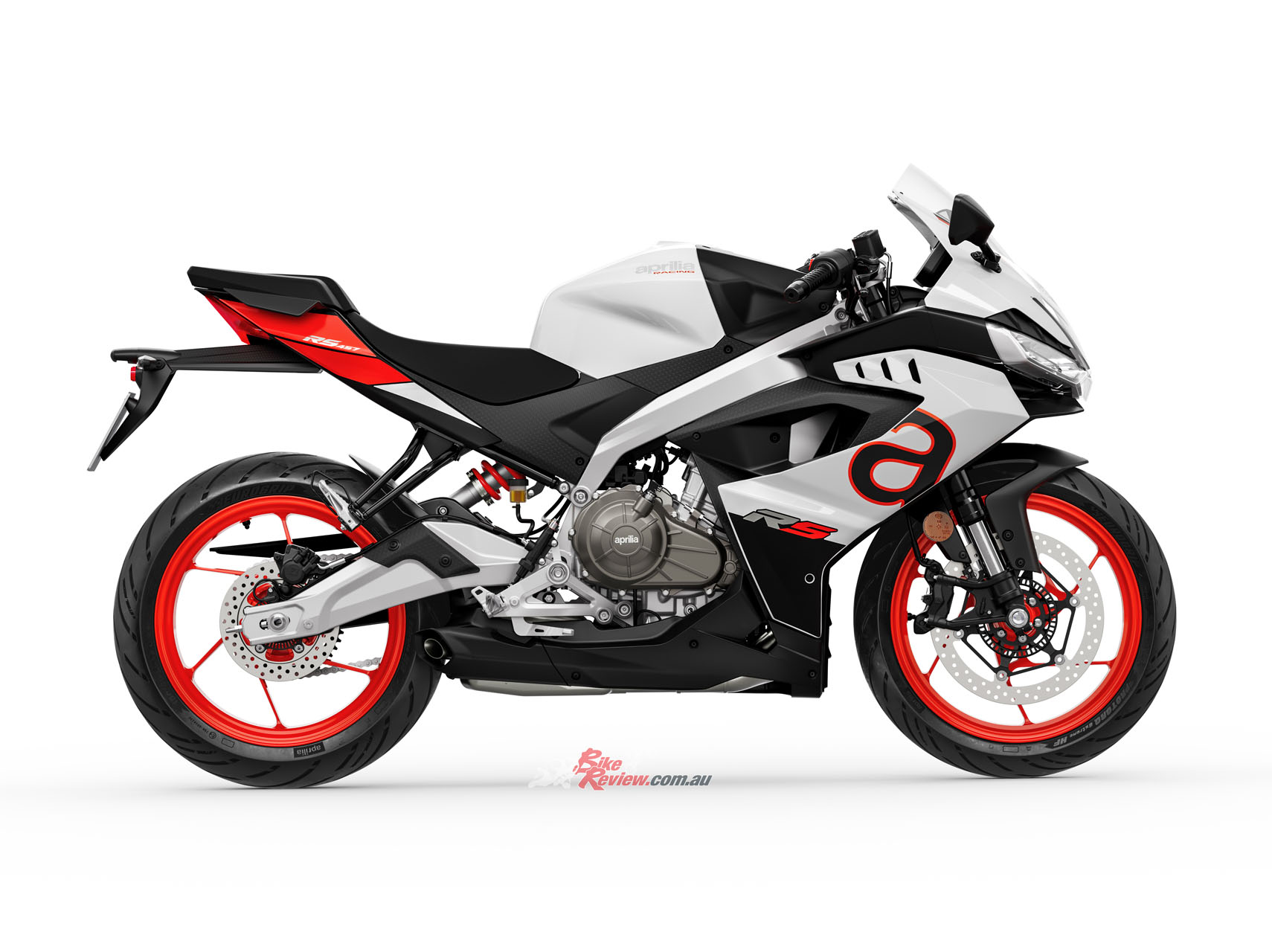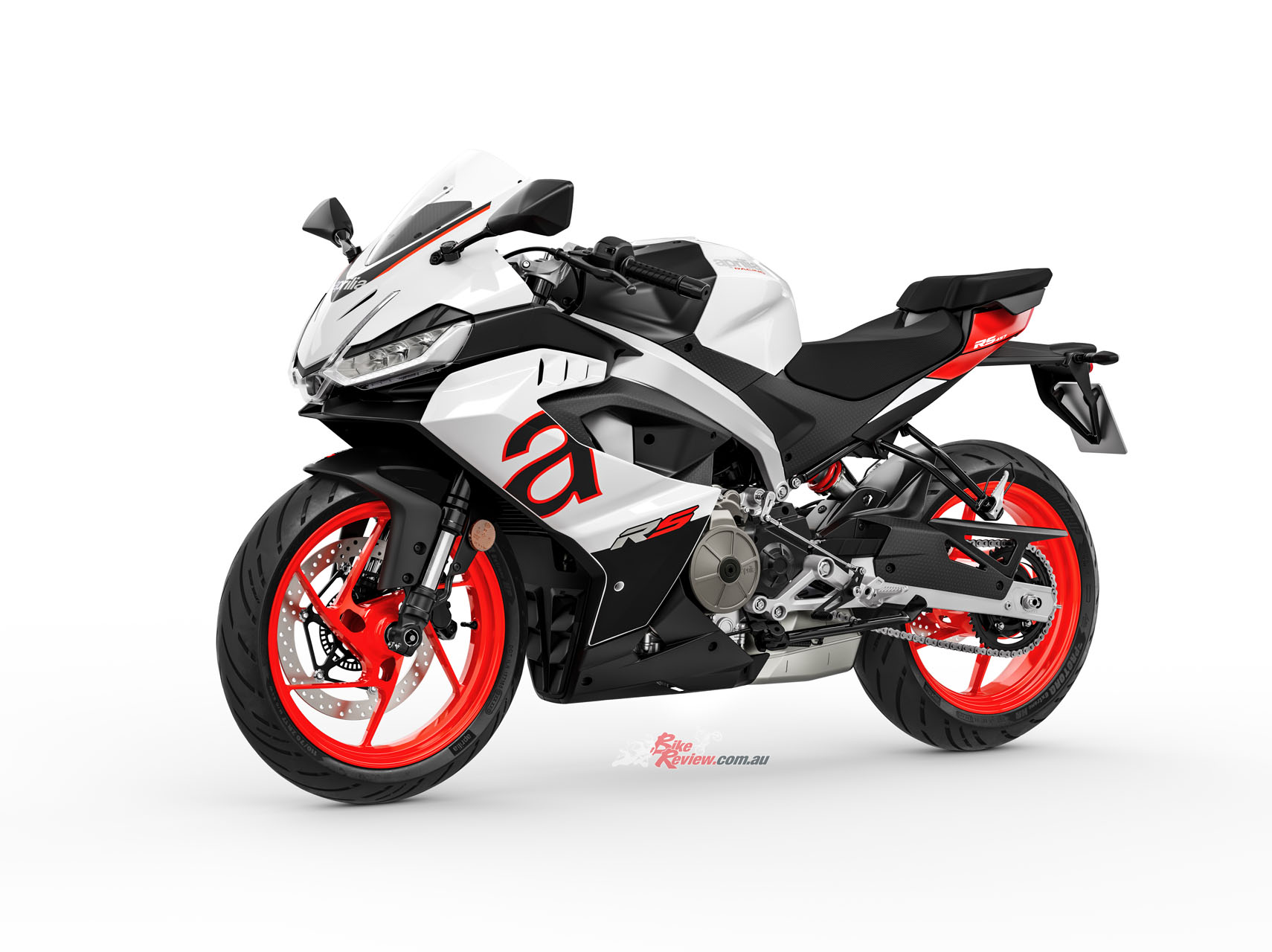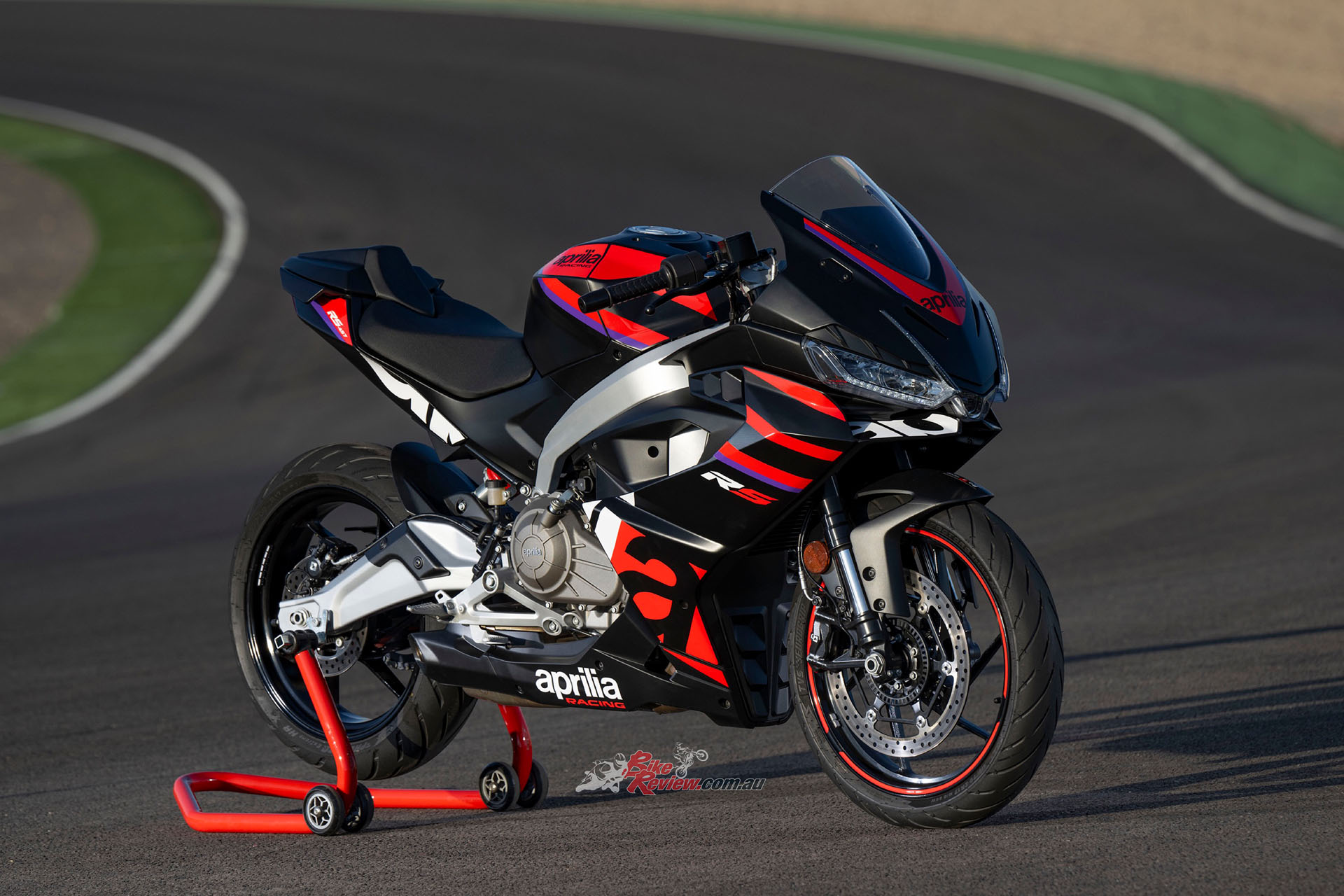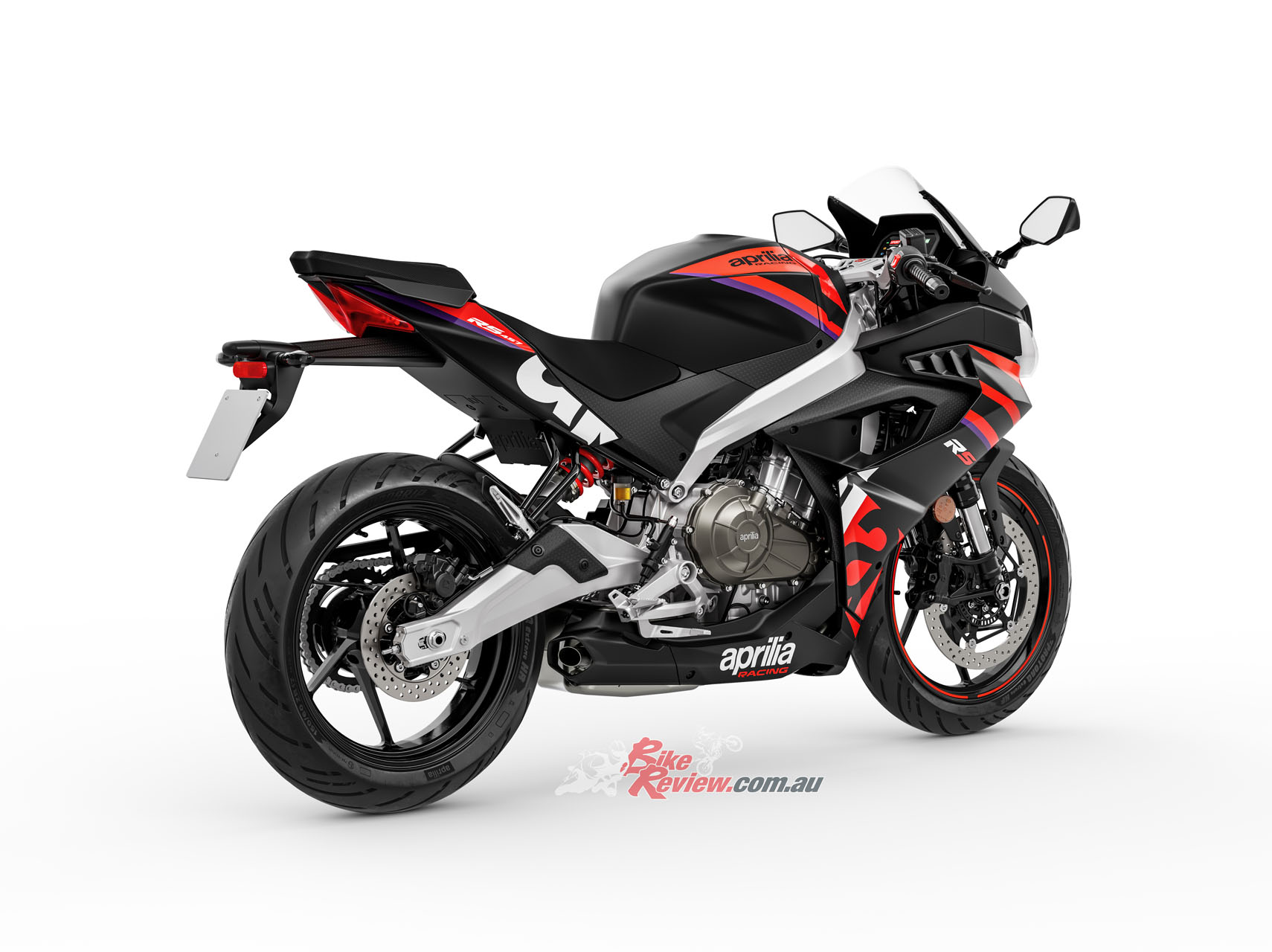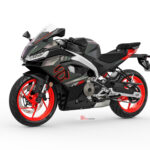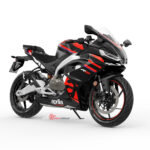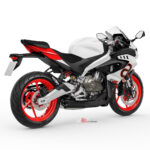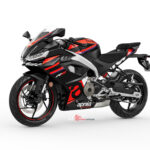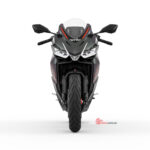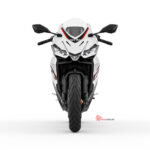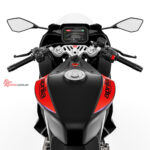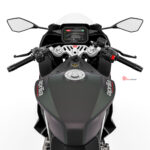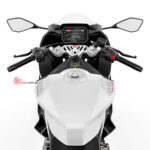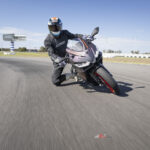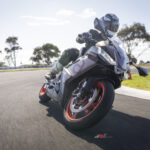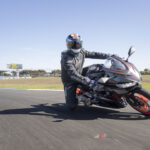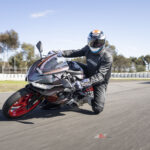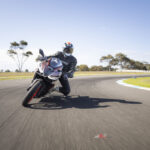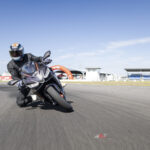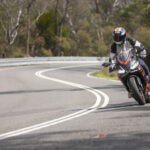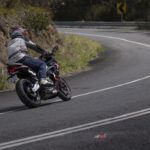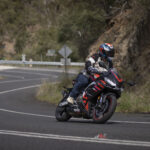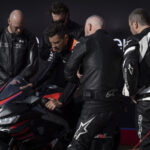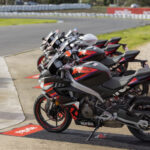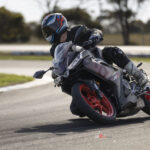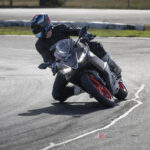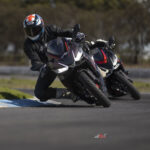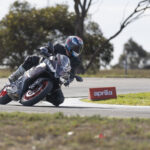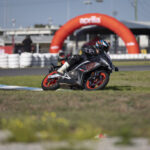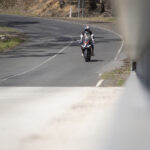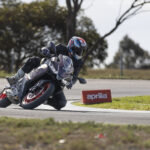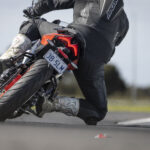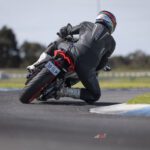Learner riders are spoilt for choice these days. I say these days, because it feels like only yesterday that I turned 16 and 9 months and could finally legally ride on the road. The bike choices back then were simply anything under 250cc, nothing like this Aprilia RS 457… Test: Matthew Shields Photos: Dean Walters.
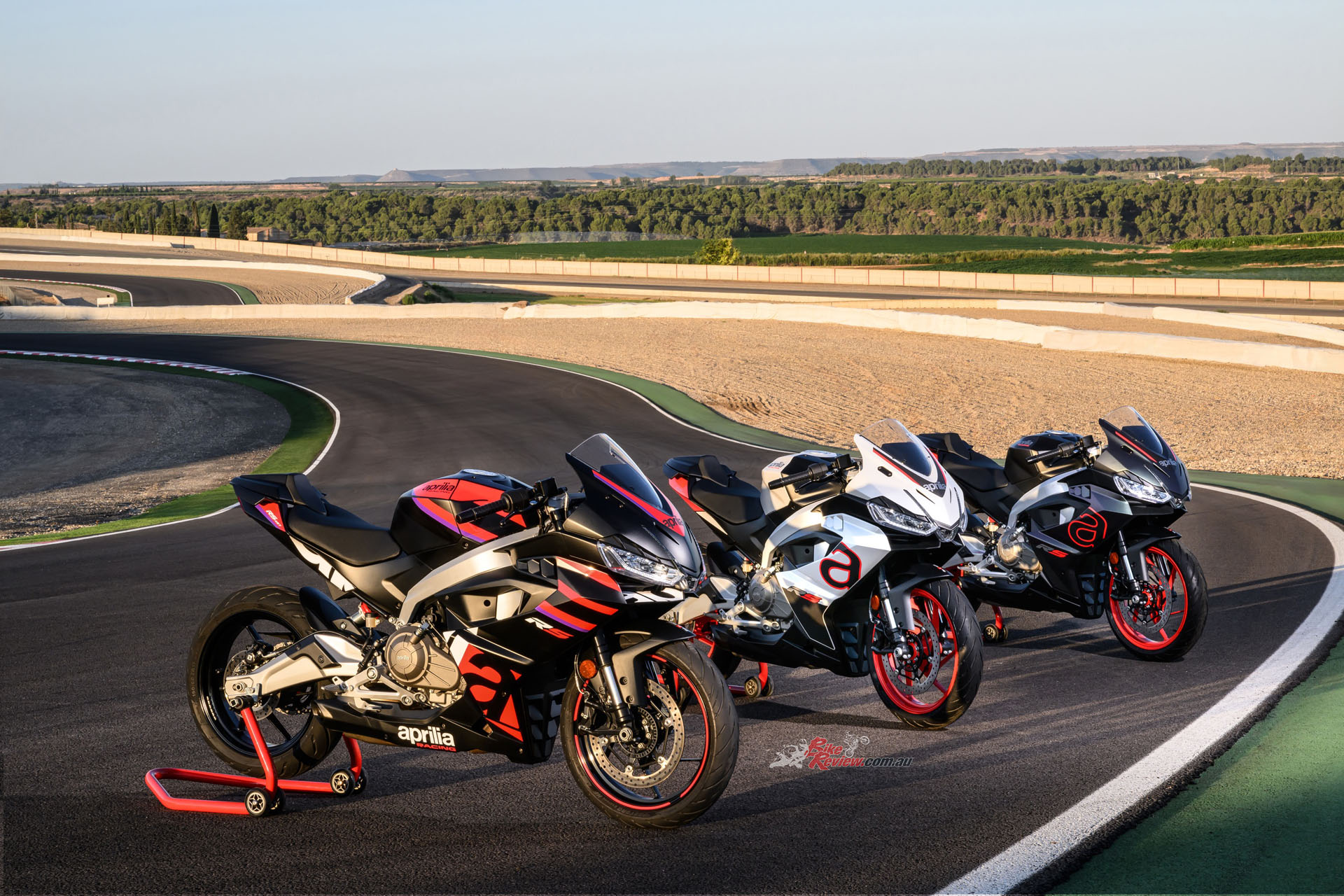
Most 250s were boring, with the exception of the Kawasaki KR-1S, Aprilia RS250 and Suzuki RGV250, but you needed a full licence to ride those. Roll on a few decades later and the choice for what is an entry-level motorcycle is phenomenal. In a range of capacities, both old and new, new riders can choose from adventure bikes, maxi scooters, cruisers, nakedbikes, tourers, sports-tourers, motards, trailbikes and, of course, sportsbikes. Enter the Aprilia RS457.
Check out our LAMS motorcycle reviews here...
Looking very much like the entry-level, race-replica version of the marque RSV4 superbike, the new RS 457 isn’t just a lookalike sportsbike for those that don’t have the experience or perhaps money to afford the production road racer. Just as with the bigger capacity bikes in the range, Aprilia has put a concerted effort into making this new twin-cylinder sportsbike go as good as it looks.
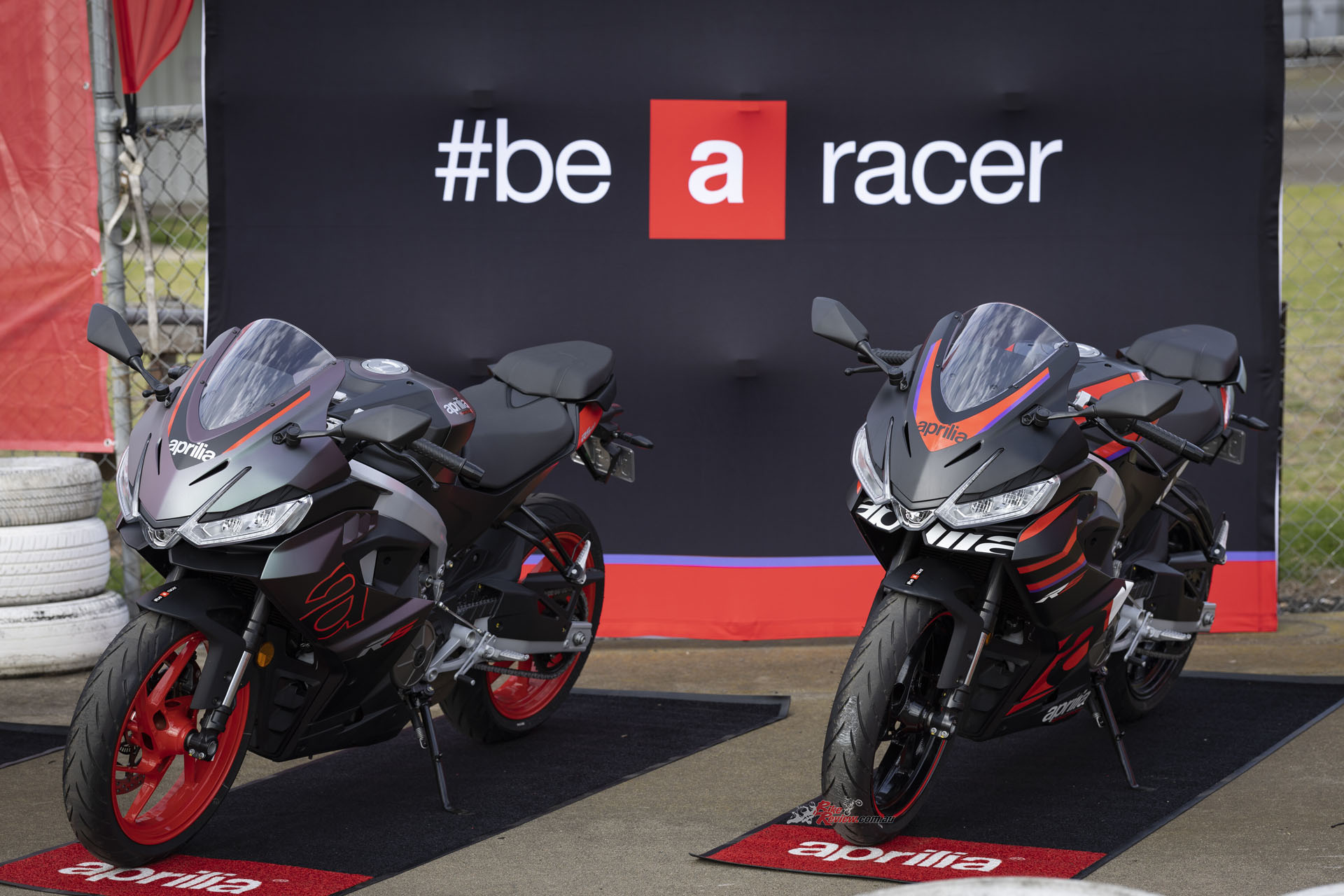
Fresh off the back of the launch of the RS 660 (read our RS 660 review here), Aprilia has bookended their sportsbike range with the parallel-twin, 457cc RS 457. Every much looking like the racer-inspired small capacity machine, this isn’t of the ilk of the two-stroke RS 250 – an out-and-out production racer, but more so an evolution of the timid four-stroke RS4 125. But unlike the RS4, Aprilia hasn’t left one aspect of this machine’s performance unfettered.
“The engine is a 270-degree firing order, 457cc parallel-twin that puts out 35kW and 44Nm – with most of that delivered by 3000rpm”…
This is a ground-up, new machine for Aprilia. The engine is a 270-degree firing order, 457cc parallel-twin that puts out 35kW and 44Nm – with most of that delivered by 3000rpm with the design centring around minimising friction (see technical breakout) across various engine components and gearbox. The architecture of the cylinder-heads isn’t too far removed from the RSV4 Aprilia claims, and at a glance it certainly looks that way.
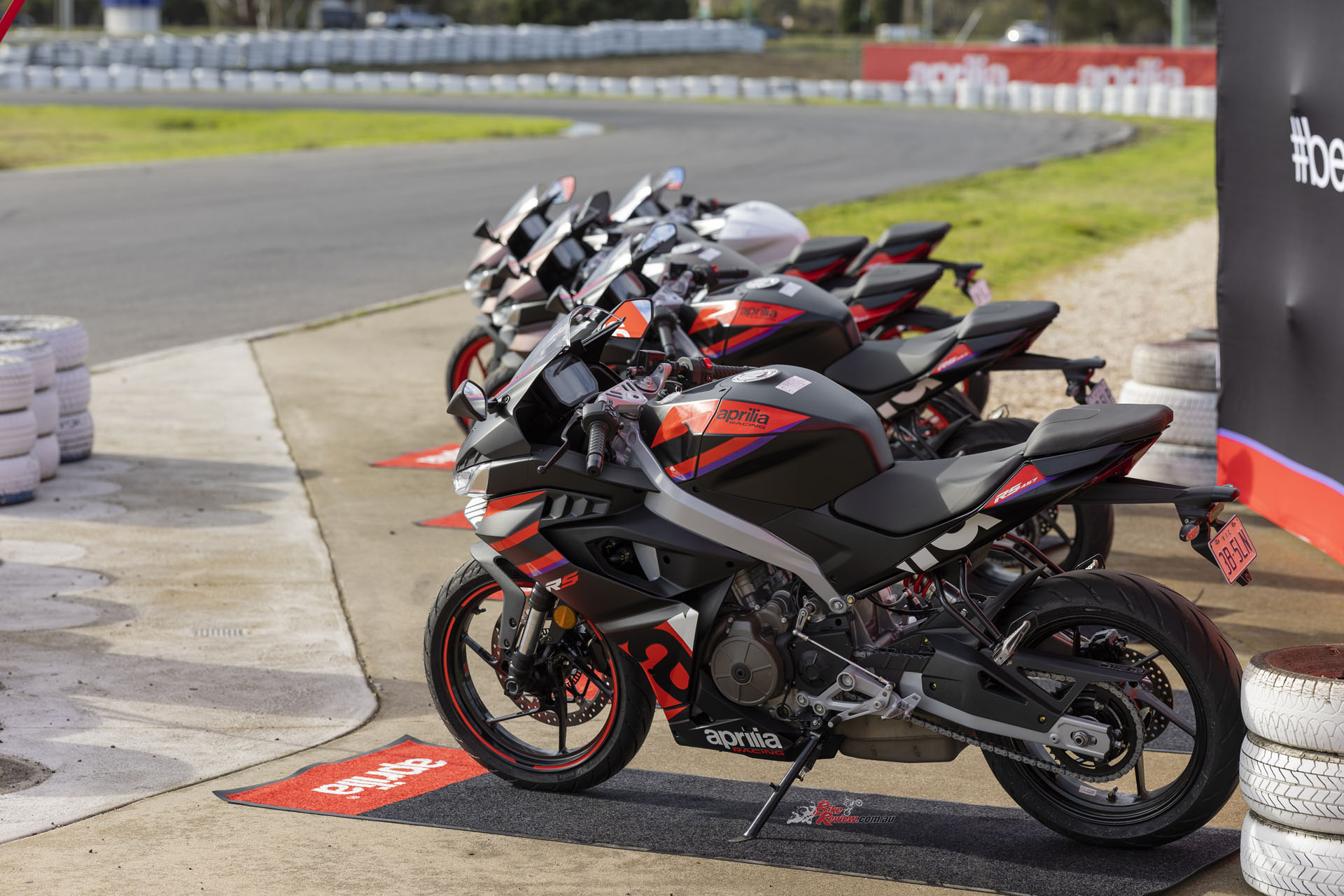
Although the twin revs out to a 10,500rpm redline, most of the torque is at hand low in the rev range. On the road, it gets away quickly from a standstill with no need for riding the clutch to get the revs up. It pulls through the rev range strongly and the good spread through the six-speed gearbox won’t see you frantically working through the ’box. Out on the open road, the strong bottom-end power means the tight and twisty stuff is fun and at freeway speeds you don’t feel like you are wringing its neck.
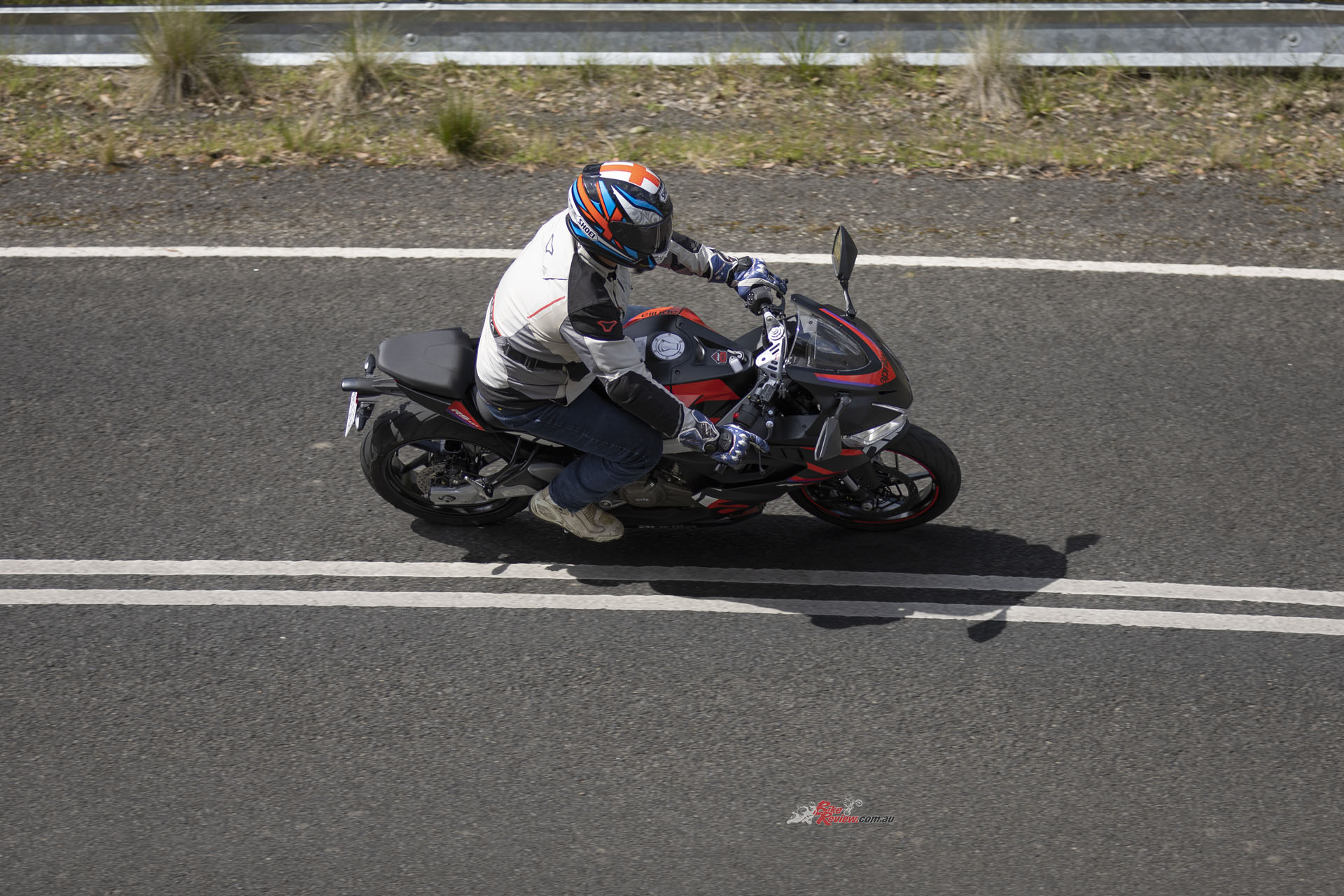
We also rode at Beckley Park International Raceway – a neat little go-kart track just behind the clubhouse turn of the Geelong Horse Racing venue. With a load of first and second gear corners, with a hard-braking first-gear hairpin, we got a great opportunity to ask the most of the 457’s engine. Just as it was on the road, the power delivery is user friendly with loads of strong low rpm torque the highlight of the package.
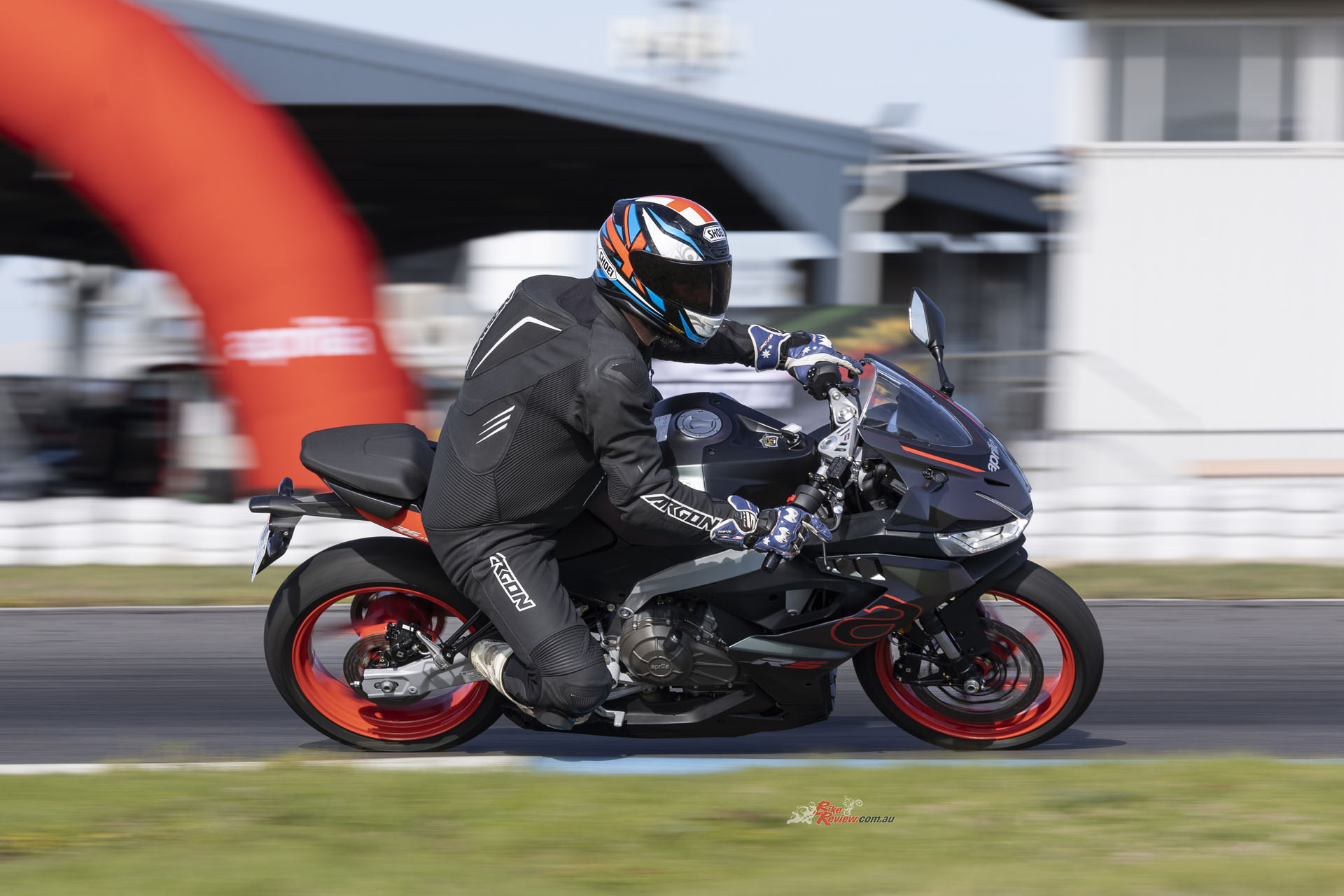
Here at the track is where the host of electronic goodies, led by the mode selectors, stood out. The three different riding modes – Eco, Sport and Rain – give a pronounced difference in power delivery via the ride-by-wire throttle. The ABS has two settings – both wheels, or front only – allowing riders who can to slide the rear end into corners. While a bi-directional quickshifter is optional, most riders won’t need one.
Traction control is standard fitment on the RS 457 and while I never used it on the track, I got to feel it work doing u-turns on a dirty country back road for the obligatory bike launch photoshoot. Being part of a Bosch system – just like the ABS – it’ll no doubt work well on wet and slippery roads. Like the riding modes, the traction control is switched simply from the switchgear and can be done on the fly. What mode and settings you have is displayed on the big 5-inch TFT dash that looks like it’s straight off a superbike.
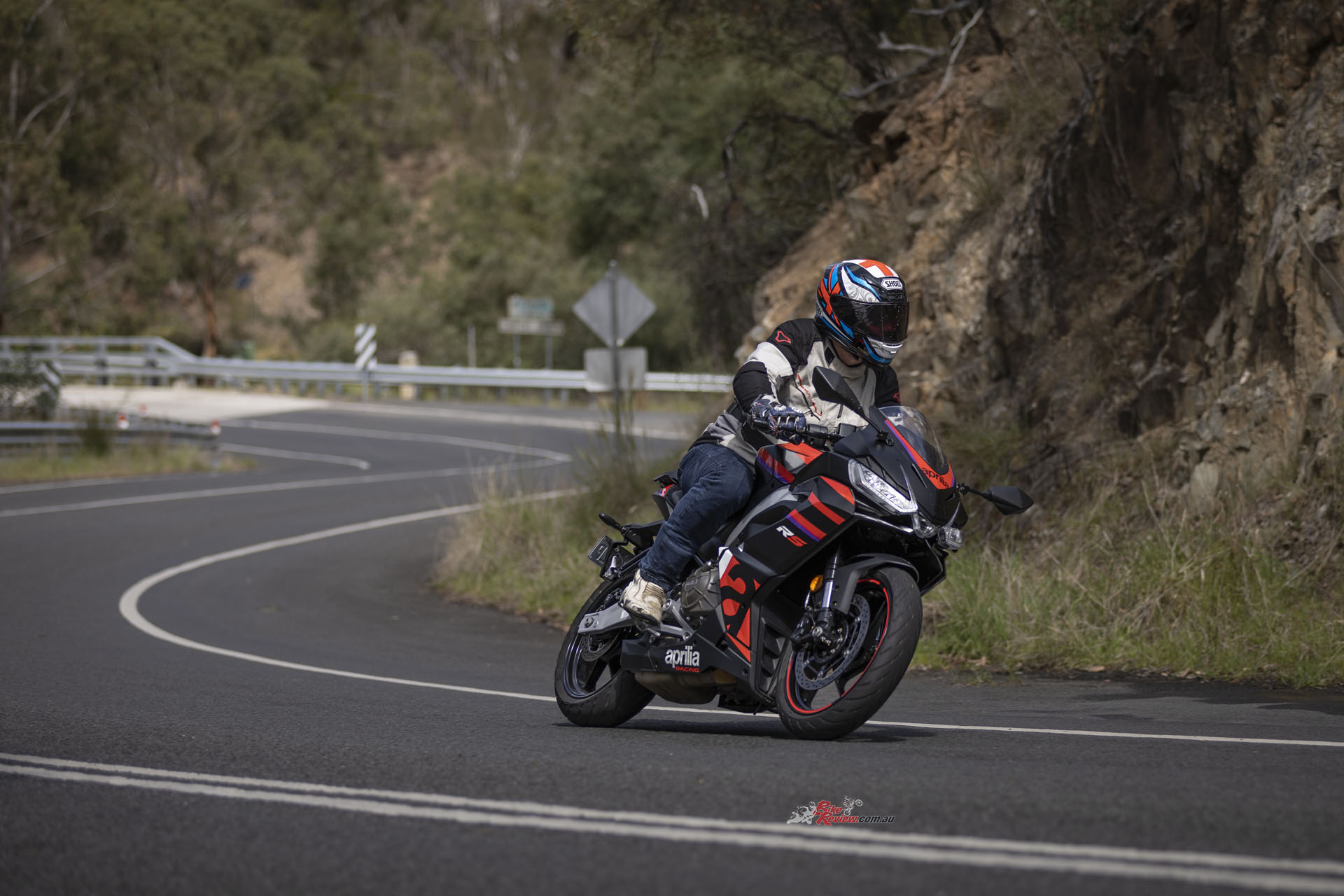
You can tell a lot of refinement has gone into getting the handling characteristics of the RS 457 just right. With preload adjustment at both ends, rolling on 110 and 150-section tyres (just like the RS250 did) and with rake, trail and wheelbase dimensions similar to the rest of the class, the twin-spar aluminium alloy frame is the biggest point of difference. The marketing blurb says Aprilia has used its experience gained through this chassis design in racing to get the RS 457 handling as it is, and it’s hard to argue with.
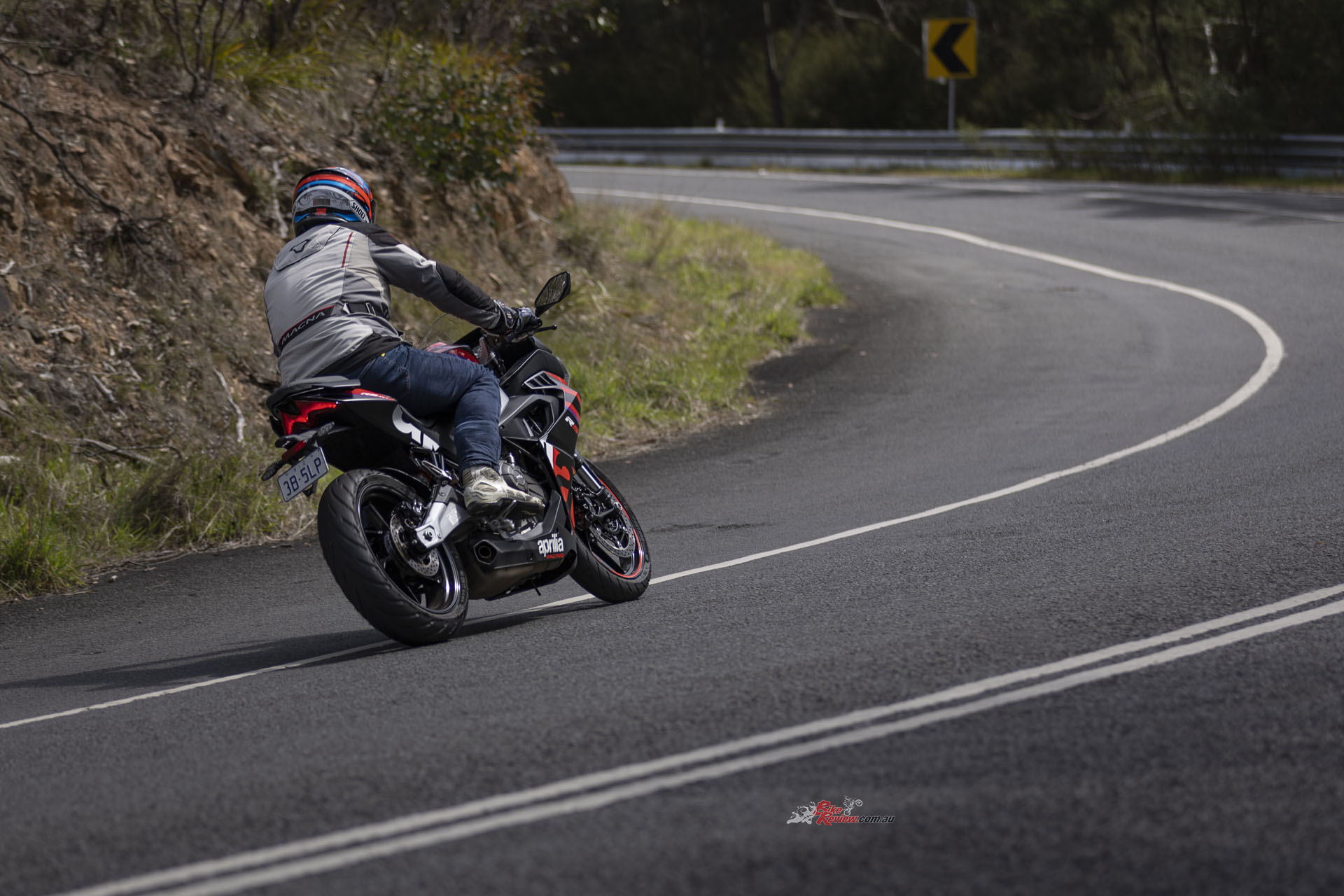
On the track the RS 457 is nimble, compliant and controlled under hard cornering and braking. Acceleration doesn’t challenge the relatively basic suspension’s compliance nor the standard fitment rubber. On the more bumpy and unpredictable conditions on the road, the suspension is just as good, and light and precise handling did not give a hint of instability, with a more comprehensive ride needed to make that a given.
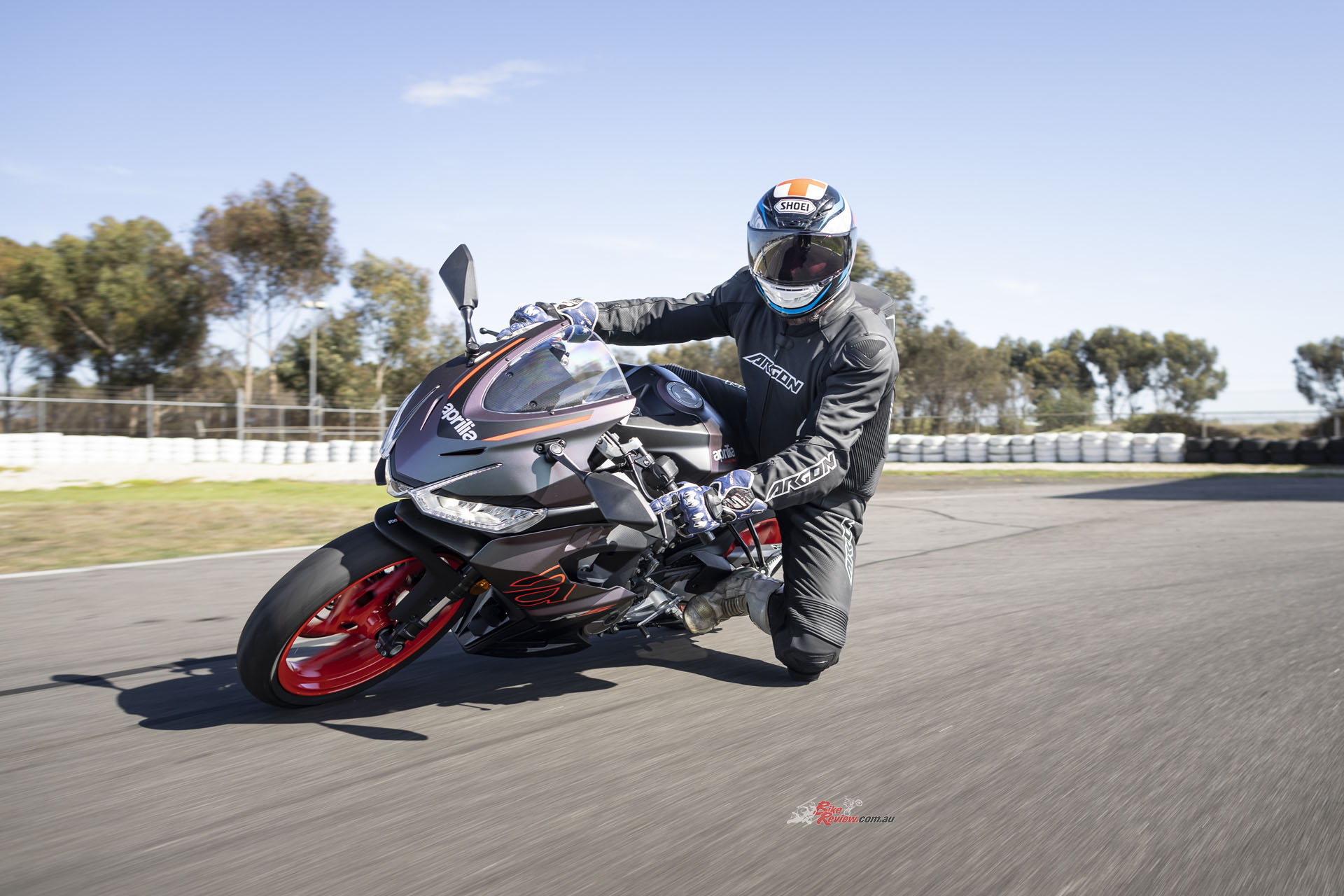
The riding position is spacious. Riders of all shapes and sizes – especially those over six-foot – found it roomy in the saddle, the reach to the handlebars not cramped and the footpegs not crampingly high nor so low that they cause ground clearance issues. Pillion comfort may not be as welcoming, but the reach from the back saddle to the footpegs is adult-sized. All in all, the ride triangle is a balance of comfort and sportiness and one that best suits the intended usage of most RS 457s.
Check out our other Aprilia reviews and content here…
The brakes look every part like top of the line sportsbike kit. A radial mounted four-piston caliper up front looks MotoGP and while it doesn’t say Brembo, it is made by their small motorcycle division ByBre – By Brembo. Braking power is exceptional both front and rear and mated with the switchable Bosch ABS a safe and high-performing package on the road and the track. There is span adjustment available on the brake lever, but not on the clutch which is cable-actuated and light as a feather.
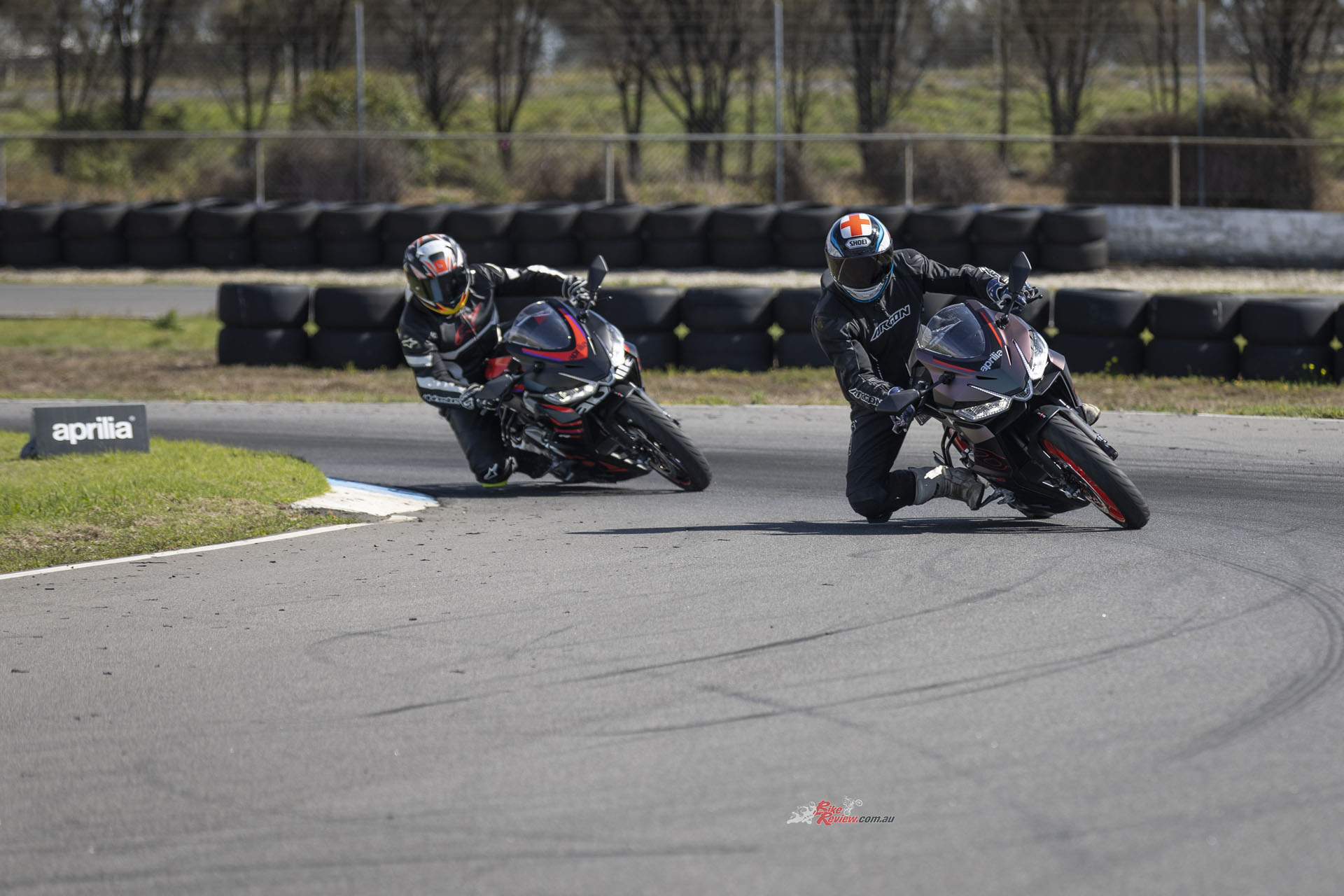
The racer-inspired styling cues don’t stop with the radial-mounted front brake either. The exhaust exiting the bellypan, sleek top triple-clamp design, indicators integrated within the headlight unit, a double-skin look to the fairing, GP-inspired aerodynamic features and the tiny rear tail unit all mimic the big boy racer as it was intended to. Throw in an extra $400 for the MotoGP-inspired Replica colour scheme and you really have a true race replica.
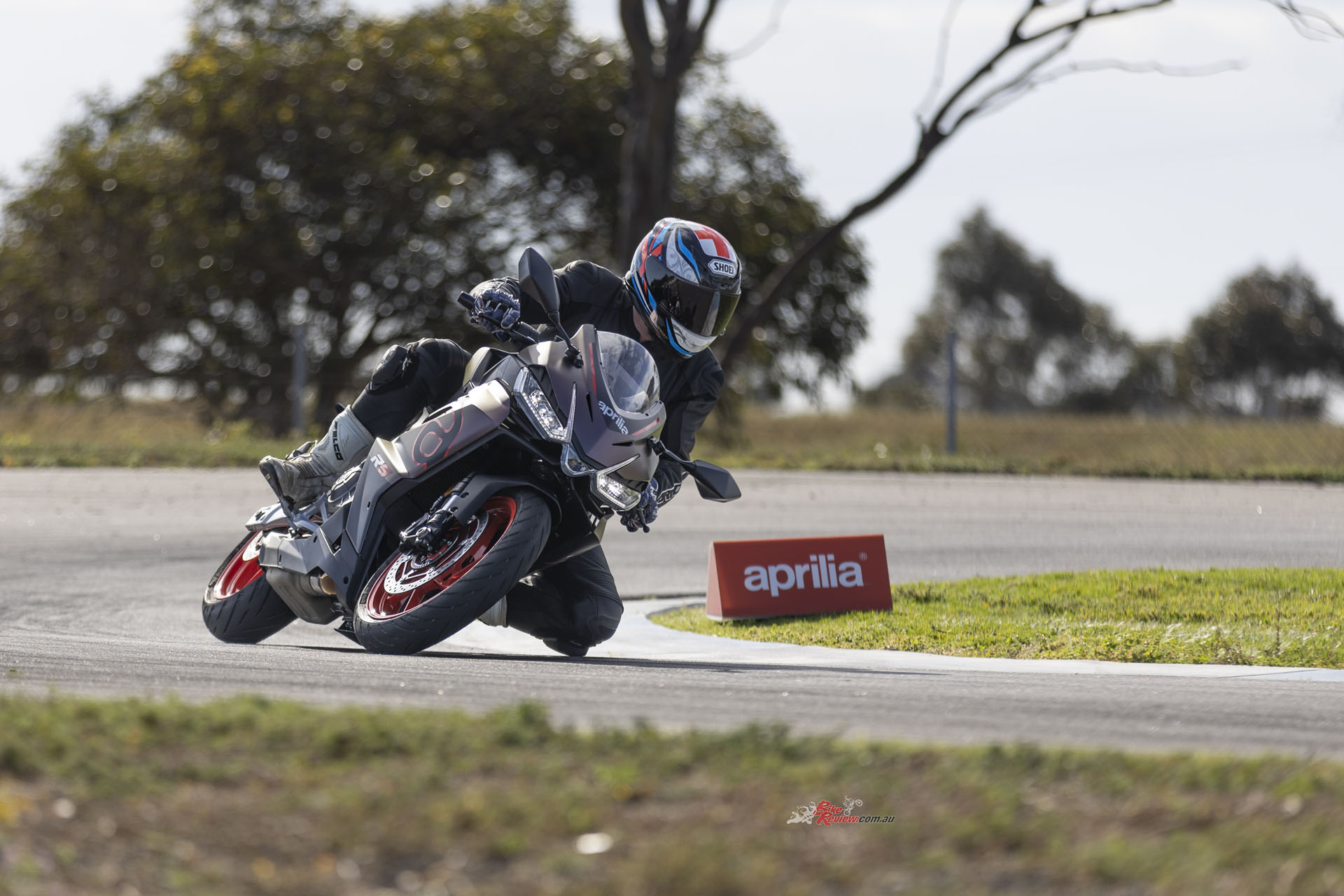
Conclusion
Best thing of all about the RS 457 is that this new machine isn’t all show and no go. With a concerted effort on creating a learner-legal machine that muscles its way to the top of the new entry-level sportsbike pack with the most power and best power-to-weight ratio allowed, Aprilia has also built a machine with the handling and engine performance that will keep experienced riders coming back for more. Check out the Rs 457 in your local Aprilia shop now, and test ride one while you are there…
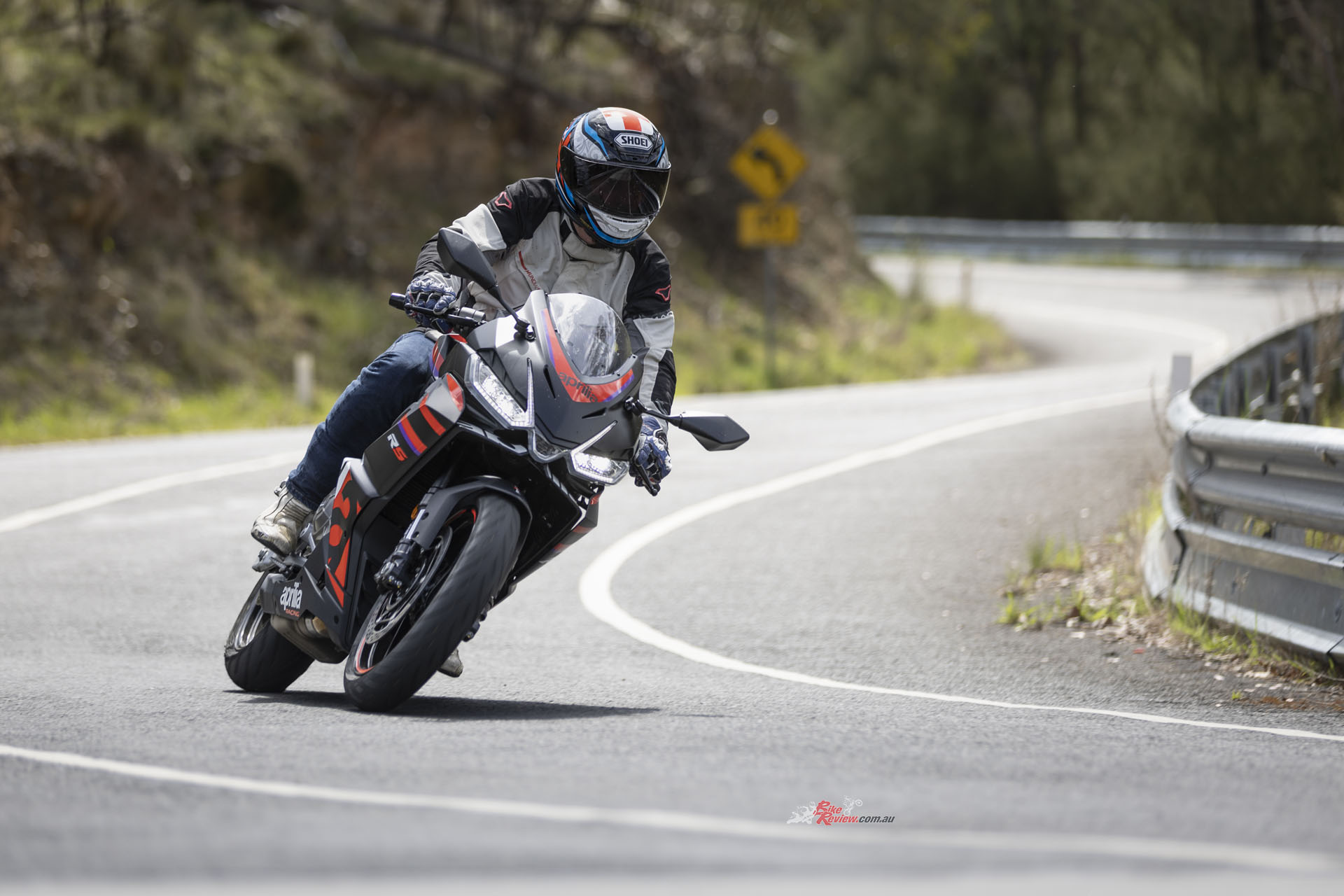
2024 Aprilia RS457 Tech Talk
Engine
The Aprilia RS 457 is powered by two-cylinder, 457cc, 270-degree, liquid-cooled engine with Double Overhead Camshafts (DOHC) with four valves per cylinder. The engine, that shares a lot of its architecture with the RSV4 superbike, has 35kW of peak power at 9400rpm and peak torque of 44Nm at 6700rpm with 82 per cent of that figure on hand from 3000rpm. Teamed with a wet weight of 175kg, the power-to-weight ratio of the RS is hard to beat in the LAMS class.
Unlike the mid-sized RS 660, the 457 engine differs in that a coolant by-pass circuit and blow-by circuit are fully integrated into the engine, with no external piping like the bigger machine has. The gearbox features roller cages like the V4 engines, instead of bushings, to reduce friction while the gearbox lubrication system is integrated into the shifting dropout shafts.
Reciprocating friction is reduced in the engine by using a cylinder offset 6.5mm from the crankshaft, roller bearings instead of bushings for the water pump and countershaft, and piston pins and timing cups with DLC coating. Fracture-split conrods are used with circular bushings and a servo clutch reduces effort at the lever along with a slipper function.
Big service intervals are another attractive point on the twin-cylinder engine while as a function of Euro 5 + emissions compliance, the RSV457 engine shuts down one cylinder on deceleration to both conserve fuel and reduce noise somewhat.
Chassis
The new twin-cylinder RS 457 engine is mounted in a dual-beam cast aluminium frame with the crankcase functioning as a load-bearing element, similarly to the way it is on the RS 660. Up front, the 41mm upside-down forks are preload adjustable, with 120mm of travel, while at the rear, the monoshock is adjustable for preload and has 130mm of travel. The swingarm is made in steel.
The braking system is made by ByBre – a Brembo brand specifically dedicated to small-to-medium displacement motorcycles and scooters – and features a 320mm front disc with a radial-mounted four-piston caliper at the front and a single piston caliper on 220mm disc at the rear. The braking system is aided by a two-channel ABS system with switchable modes – for either both wheels or front wheel only. The 17-inch aluminium alloy wheels mount to a 110/70 front and 150/60 rear tyres.
Electronics
The RS 457 is bustling with a range of tech goodies you don’t see standard on bikes in this class. The LED headlight echoes cues of the Aprilia sportsbike family while the front indicators are integrated into the headlight’s light signature. The dashboard is no less than a 5.0-inch TFT (Thin Film Transistor) colour instrument cluster, while the switchgear on the handlebars are elegantly backlit.
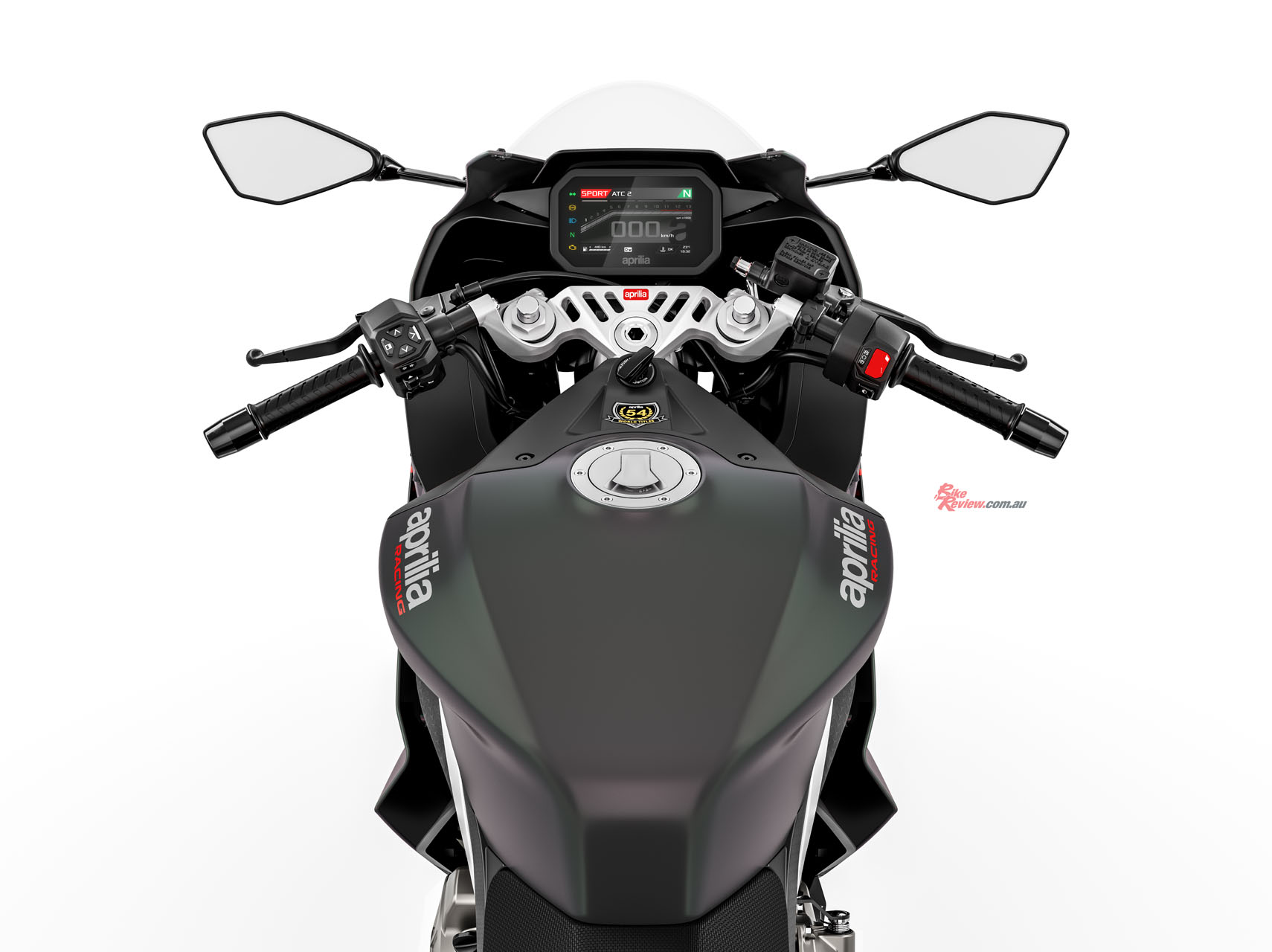 The Ride-by-Wire throttle system – which Aprilia was the first to introduce both in MotoGP and on production motorcycles – manages the engine with three riding modes that intervene on power, torque and traction control. They are adjustable to three levels on the fly – Eco, Sport and Rain – a can also be disabled. A bi-directional quickshifter is also available as an accessory. The Bosch ABS system has two settings: ABS on both wheels for road usage and ABS front on and rear off, suggested for racetrack use only. Turning off the rear ABS is done by a long press of the riding mode button only when the bike is stationary. Smartphone connectivity (Aprilia MIA) and navigation are also available
The Ride-by-Wire throttle system – which Aprilia was the first to introduce both in MotoGP and on production motorcycles – manages the engine with three riding modes that intervene on power, torque and traction control. They are adjustable to three levels on the fly – Eco, Sport and Rain – a can also be disabled. A bi-directional quickshifter is also available as an accessory. The Bosch ABS system has two settings: ABS on both wheels for road usage and ABS front on and rear off, suggested for racetrack use only. Turning off the rear ABS is done by a long press of the riding mode button only when the bike is stationary. Smartphone connectivity (Aprilia MIA) and navigation are also available
APRILIA RS 457 GENUINE ACCESSORIES
A host of genuine accessories are available for the RS457 ranging from bike covers and USB sockets through to racing brake pads and tyre pressure monitoring system. For more information visit www.aprilia.com/au.
Passenger seat cover $155.85
Adjustable front brake lever $242.20
Adjustable clutch lever $246.75
Rear brake Lever $305.90
Gear lever $248.50
Brake lever protection $473.40
Aluminium plate holder $389
USB charging socket $38.50
Racing brake pads $333.25
Rider footpegs $364.15
Front axle protector $138.50
Helmet lock $71
TPMS (Tyre Pressure Monitoring System) RS457 $456
High windscreen $125
Thermoformed side cases (with holders) $1154.15
Tank bag $482.50
Lower rider comfort seat $275
Standard comfort seat $298
Passenger comfort handle $128
Outdoor bike cover $267.70
Indoor bike cover $458.20
Electronic anti-theft $287.75
Electronic anti-theft assembly system $215.40
MIA device $208.20
MIA device assembly system $73.75
Wheel stickers $38.30
Side tank protection stickers $163.85
Central tank protection stickers $66.90
Bi-directional quickshifter $441.20
2024 Aprilia RS 457 Specifications
Price: $12,540 (Replica: $12,940) rideaway
Warranty: Two-years unlimited km
Colours: Prismatic Dark, Opalescent Light and Racing Stripes
Claimed Power: 35kW@9400rpm
Claimed Torque: 44Nm@6700rpm
Kerb Weight: 175kg
Fuel capacity: 13L
Fuel Consumption Claimed: N/A
Fuel Consumption (measured): N/A
Engine: Liquid-cooled, 270-degree parallel twin-cylinder, four-stroke engine with four valves per cylinder, 10.5:1 compression ratio, 69mm x 61.1mm bore x stroke, 457cc, 26mm EFI with Ride-By-Wire throttle Gearbox: Six speed, constant mesh Clutch: Multiplate in oil bath with slipper system
Chassis: Frame: Dual beam cast-aluminium frame
Rake: 24 degrees Trail: 102.4mm
Suspension: 41mm upside-down fork, preload adjustable, 120mm travel (f) steel swingarm, monoshock with adjustable preload, 130mm travel (r) Brakes: 320mm disc, four-piston radial-mounted By-Bre caliper (f), 220mm disc, single-piston By-Bre floating caliper (r) Wheels & Tyres: Aluminium-alloy wheels 3.0 x 17-inch (f) 4.5 x 17-inch (r), Tyres 110/70ZR17 (f) 150/60ZR17 (r)
Dimensions:
Seat height: 800mm
Ground clearance: N/A
Overall width: 760mm
Overall Length: 1983mm
Overall height: 1162mm
Wheelbase: 1349mm
Instruments & Electronics: LED headlight assembly. Engine maps (AEM), dual-channel ABS with anti roll-over system (two maps), traction control (ATC), three riding modes. 5-inch TFT instrument panel. Backlit handlebar controls.



